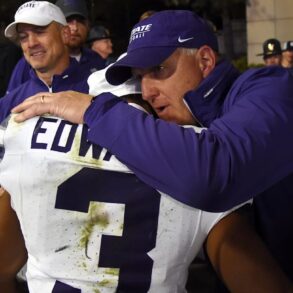
Kirby Smart on college football’s future
Kirby Smart urges leaders to prioritize the game’s future over personal or conference agendas in playoff talks.
If you’re explaining, you’re losing.
I thought about that old Ronald Reagan quote last week at the SEC spring meetings while the conference launched a days-long propaganda campaign explaining why it deserved more respect from the College Football Playoff committee.
The SEC’s best programs lost too often the past few years. Alabama’s four losses last season marked its most since 2007. Georgia lost just twice in three seasons from 2021-23 before losing three times last year. LSU hasn’t lost fewer than three times in a season since 2019. That 2019 season also marks the last time Florida won more than eight games. The less said the better about Auburn’s past five seasons.
We can debate whether the playoff committee would have been wiser to select a three-loss SEC team rather than SMU, but there’s no arguing this: A Big Ten team won the national championship each of the past two seasons, and the SEC didn’t even advance a team to the title game in those years.
The SEC’s consecutive seasons without a champion mark its longest drought since Florida State and Ohio State won the titles in 2013 and 2014.
It’s not that the SEC came unglued. It remains a deep league with few weaklings, but the SEC’s cream wasn’t as sweet as the Big Ten’s last season.
That left the SEC to explain its mightiness with rhetoric and graphs, rather than pointing to the national championship scoreboard.
“This (league) is not like any other,” SEC commissioner Greg Sankey said on the final day of his conference’s propaganda blitz in Miramar Beach, Florida.
Sankey paired that quote with a packet of paper several pages in length that sought to explain the SEC’s greatness.
NO CUPCAKES: If SEC wants playoff respect, it needs tougher games
BIG DECISION: SEC’s Greg Sankey can be hero or villain in playoff debate
While several SEC coaches and administrators tried to prop up the league with their words, LSU coach Brian Kelly broke ranks and spoke some plain truth.
“Look, the Big Ten right now holds it on the SEC,” Kelly said. “They won the last two national championships. That’s the reality of it.”
Here’s more reality: Big Ten teams went 6-4 in games against SEC opponents last season, including postseason results.
Kelly, a skilled orator, didn’t compliment the Big Ten for no reason. He paired his praise by challenging the SEC and Big Ten athletic directors and commissioners to come to agreement on more interconference matchups between these two super leagues.
Count Kelly among those who favor a Big Ten-SEC challenge.
“As (SEC) coaches – and I can speak for the room – we want to play Big Ten schools,” Kelly said. “You’ve got to get a partner. You’ve got to get a partner who says, ‘We’re in for that, too.’ We’ve made our voice clear. Our ADs know that, as well.”
Kelly exaggerated when he said he spoke for the room of SEC coaches. In truth, some other SEC coaches sounded more squeamish about the idea of an annual game against a Big Ten foe. Kelly is smart to push the envelope, though, because the SEC needs this interconference challenge more than the Big Ten does.
The SEC ruled the four-team playoff, but the conference up north scored the early advantage in the expanded playoff, both in number of qualifiers and bracket advancement.
The SEC might be deeper in number of robust teams, but a 12- or even 16-team playoff works well for the Big Ten’s quest to qualify its top quartet, even if the conference wavers down ballot.
This season, SEC newcomers Texas and Oklahoma will play Ohio State and Michigan, respectively. Alabama’s game against Wisconsin is the only other Big Ten-SEC matchup.
“We want to get challenged (by Big Ten opponents),” Kelly said, in what amounted to chiding a heavyweight belt holder to step into the ring.
The SEC’s most authoritative path to gobbling up at-large playoff spots would be to repeatedly beat Big Ten teams in non-conference clashes.
Consider the SEC’s basketball uprising. It dominated the non-conference schedule last season, including a 14-2 record in the ACC-SEC challenge.
Come Selection Sunday, an NCAA record 14 SEC teams qualified for March Madness. The SEC didn’t need to explain itself, because it owned the scoreboard.
Not too many years ago, that was true of SEC football, too.
This little Big Ten revolution spurred the SEC to double down on talking points. Anyone that spends that much time explaining must be losing a bit too much for comfort.
Blake Toppmeyer is the USA TODAY Network’s national college football columnist. Email him at BToppmeyer@gannett.com and follow him on X @btoppmeyer.
This post was originally published on this site be sure to check out more of their content.








